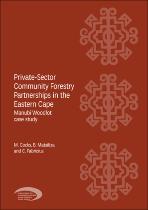 ResearchSpace
ResearchSpace
Private sector community forestry partnerships in the Eastern Cape – The Manubi woodlot case study
JavaScript is disabled for your browser. Some features of this site may not work without it.
- ResearchSpace
- →
- Archives collection
- →
- Open Access Reports
- →
- View Item
| dc.contributor.author |
Cocks, M

|
|
| dc.contributor.author |
Matsiliza, B

|
|
| dc.contributor.author |
Fabricius, C

|
|
| dc.date.accessioned | 2008-10-21T14:44:05Z | |
| dc.date.available | 2008-10-21T14:44:05Z | |
| dc.date.issued | 2000 | |
| dc.identifier.citation | Cocks, M., Matsiliza, B & Fabricius, C. 2000. Private-Sector Community Forestry Partnerships in the Eastern Cape: Manubi Woodlot Case Study. Instruments for sustainable private sector forestry, South Africa series. International Institute for Environment and Development and CSIR-Environmentek, London and Pretoria, pp 19 | en |
| dc.identifier.uri | http://hdl.handle.net/10204/2497 | |
| dc.description | A report prepared as part of the South Africa Country Study for the international collaborative research project steered by IIED: Instruments for sustainable private sector forestry Partners in the South Africa Country study: CSIR-Environmentek International Institute for Environment and Development (IIED) In association with: Department for Water Affairs and Forestry South Africa | en |
| dc.description.abstract | In line with policy changes in the Department of Water Affairs and Forestry (DWAF), the Manubi forest and woodlot has been declared a Primary Conservation Area and responsibility for management has been transferred to its Conservation directorate. While plans are underway to transfer ownership, control and management of most woodlots to local communities through a process referred to as ‘devolution’, woodlots that fall within primary conservation areas will remain under DWAF control. In these cases opportunities for joint management will be investigated. The Manubi woodlot falls within a primary conservation area, so will not undergo devolution but the possibility of joint management does exist. The brief given to the authors was to draw up a situational analysis of Manubi forest to assess the potential for joint management. A major focus of the research was to identify the main role players, and assess use of and attitudes towards the forests and the relationships between the various role players. The fieldwork was undertaken in April 2000 | en |
| dc.language.iso | en | en |
| dc.publisher | IIED & CSIR | en |
| dc.subject | Private-sector | en |
| dc.subject | Community forestry partnership | en |
| dc.subject | Eastern Cape | en |
| dc.subject | Manubi Woodlot case study | en |
| dc.subject | IIED | en |
| dc.title | Private sector community forestry partnerships in the Eastern Cape – The Manubi woodlot case study | en |
| dc.title.alternative | Outgrower schemes and community-company partnerships | en |
| dc.type | Report | en |
| dc.identifier.apacitation | Cocks, M., Matsiliza, B., & Fabricius, C. (2000). <i>Private sector community forestry partnerships in the Eastern Cape – The Manubi woodlot case study</i> IIED & CSIR. Retrieved from http://hdl.handle.net/10204/2497 | en_ZA |
| dc.identifier.chicagocitation | Cocks, M, B Matsiliza, and C Fabricius <i>Private sector community forestry partnerships in the Eastern Cape – The Manubi woodlot case study.</i> IIED & CSIR, 2000. http://hdl.handle.net/10204/2497 | en_ZA |
| dc.identifier.vancouvercitation | Cocks M, Matsiliza B, Fabricius C. Private sector community forestry partnerships in the Eastern Cape – The Manubi woodlot case study. 2000 [cited yyyy month dd]. Available from: http://hdl.handle.net/10204/2497 | en_ZA |
| dc.identifier.ris | TY - Report AU - Cocks, M AU - Matsiliza, B AU - Fabricius, C AB - In line with policy changes in the Department of Water Affairs and Forestry (DWAF), the Manubi forest and woodlot has been declared a Primary Conservation Area and responsibility for management has been transferred to its Conservation directorate. While plans are underway to transfer ownership, control and management of most woodlots to local communities through a process referred to as ‘devolution’, woodlots that fall within primary conservation areas will remain under DWAF control. In these cases opportunities for joint management will be investigated. The Manubi woodlot falls within a primary conservation area, so will not undergo devolution but the possibility of joint management does exist. The brief given to the authors was to draw up a situational analysis of Manubi forest to assess the potential for joint management. A major focus of the research was to identify the main role players, and assess use of and attitudes towards the forests and the relationships between the various role players. The fieldwork was undertaken in April 2000 DA - 2000 DB - ResearchSpace DP - CSIR KW - Private-sector KW - Community forestry partnership KW - Eastern Cape KW - Manubi Woodlot case study KW - IIED LK - https://researchspace.csir.co.za PY - 2000 T1 - Private sector community forestry partnerships in the Eastern Cape – The Manubi woodlot case study TI - Private sector community forestry partnerships in the Eastern Cape – The Manubi woodlot case study T2 - Outgrower schemes and community-company partnerships UR - http://hdl.handle.net/10204/2497 ER - | en_ZA |





